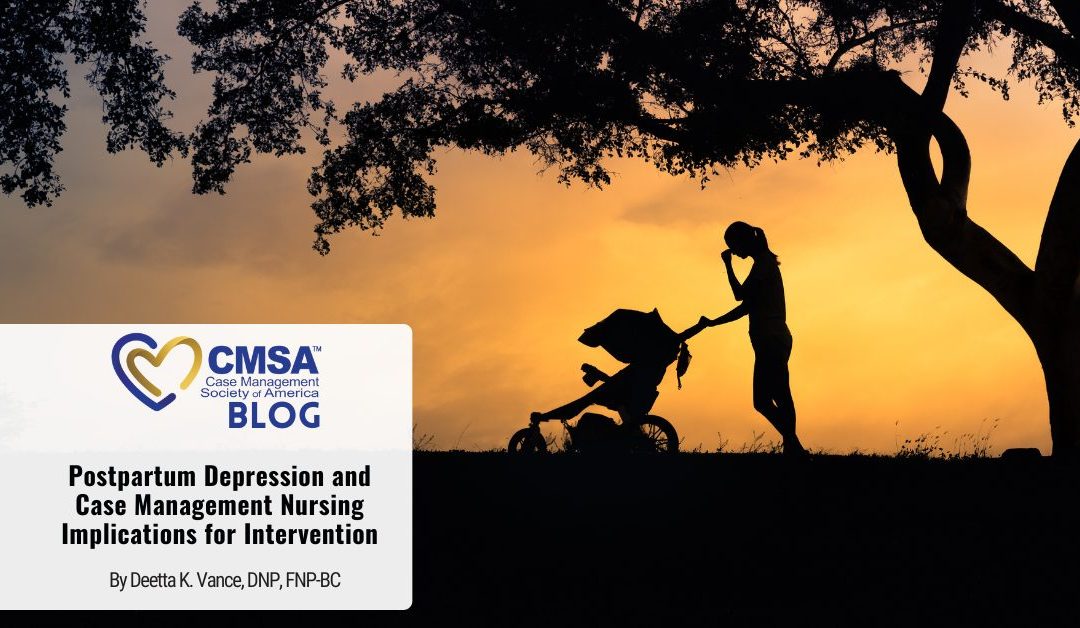By Deetta K. Vance, DNP, FNP-BC
Postpartum depression (PPD) is a common condition that can occur within the first year following the birth of a child. PPD can manifest in a variety of ways. Although there is no identifiable cause of PPD, there are similar risk factors that seem to be present in women who are impacted by this condition, including being unemployed, single, a first-time mother, low socioeconomic status, and cultural backgrounds.
Approximately one in eight women experience symptoms of PPD that include feelings of anxiety, depressed mood, failure to connect with the newborn, feelings of abandonment, being unloved or unwanted, and feeling overwhelmed (Simhi et al., 2019). The rapid physiological changes that occur in women following the birth of a child, including shifts in hormones, body image changes, and results of sleep deprivation from caring for the infant, often lead to a transient overwhelming experience; however, if those feelings last longer than a period of two weeks, or if the mother experiences continued anxiety, depression, or thoughts of suicide, the mother should be evaluated for PPD (Office on Women’s Health, 2024).
Nursing intervention stands to take a significant role in the identification, screening, referral, and management of women who are experiencing PPD. Often, the obstetrician’s (OB) office is ill-equipped to handle moderate to severe cases of PPD. However, that is typically the site of care the mother leans on for this time. Mental health screenings, such as the Patient Health Questionnaire-9 (PHQ-9), are frequently conducted in the immediate postpartum period. However, it is a common occurrence that the results of these screenings are not addressed simply because either the OB feels that mental health concerns fall outside of the scope of practice or there is a lack of access to care for the mother. The mother’s PPD is then left unmanaged, and this can lead to devastating results, including increasing risks of death or injury to the mother and the infant (Coffman et al., 2020).
Developing policies to put screenings and interventions in place for early identification of PPD symptoms is a crucial nursing function that stands to reduce risks associated with PPD, as well as improve the quality of life for both the mother and the infant (Simhi et al., 2019). The mother may feel embarrassed about her symptoms or may not understand or recognize that the symptoms are abnormal. Therefore, a case management nurse who is trained in understanding the symptoms and effects of PPD is instrumental in supporting these mothers through what can be a frightening and isolating time. From a case management standpoint, the opportunity exists for the aware case management nurse to identify that the mother is experiencing a problem and not only work quickly to connect her to a health care provider who can help her effectively but also serve as a support and engage in follow up communication to ensure the safety of both the mother and the infant (Coffman et al., 2020).
Have you downloaded your free copy of “Communicating Your Value: The Case Manager’s Guide?” This collaboration by CMSA and the Center for Case Management will empower your practice, educate your peers, and showcase your value: 🔗 https://cmsa.org/cmsa-cfcm-position-paper-2023/
References
Coffman, M. J., Scott, V. C., Schuch, C., Mele, C., Mayfield, C., Balasubramanian, V., Stevens, A., & Dulin, M. (2020). Postpartum depression screening and referrals in special supplemental nutrition program for women, infants, and children clinics. Journal of Obstetric, Gynecologic & Neonatal Nursing, 49(1), 27–40. https://doi.org/10.1016/j.jogn.2019.10.007
Office on Women's Health. (2024). Talking postpartum depression. Www.womenshealth.gov. https://www.womenshealth.gov/TalkingPPD?gclid=Cj0KCQiAh8OtBhCQARIsAIkWb68qGHY60uA73jlswMHVV1mKPY37fCtCTcUaq7ijNmYrg7TLGYvvufUaAimxEALw_wcB
Simhi, M., Sarid, O., & Cwikel, J. (2019). Preferences for mental health treatment for post-partum depression among new mothers. Israel Journal of Health Policy Research, 8(1). https://doi.org/10.1186/s13584-019-0354-0
Bio: Dr. Deetta K. Vance completed her Family Nurse Practitioner degree at Indiana State University and her Doctor of Nursing Practice from the University of Alabama. She is an Associate Professor in the School of Nursing at Indiana State and has served the community in a variety of practice fields including palliative medicine, school-based care, urgent care, and occupational health, as well as volunteering in the local community to provide physicals to underserved youth.


Great blog. And important topic.